- Home
- Harlan Coben
Gone for Good (2002) Page 2
Gone for Good (2002) Read online
Page 2
"I love you," I said.
"What's not to love?" she countered.
I did not roll my eyes. Sheila had been good to my mother toward the end. She'd take the Community Bus Line from Port Authority to Northfield Avenue and walk over to the St. Barnabas Medical Center.
Before her illness, the last time my mom had stayed at St. Barnabas was when she delivered me. There was probably something poignantly life-cycling about that, but I couldn't see it just then.
I had however seen Sheila with my mother. And it made me wonder. I took a risk.
"You should call your parents," I said softly.
Sheila looked at me as though I'd just slapped her across the face. She slid off the bed.
"Sheila?"
"This isn't the time, Will."
I picked up a picture frame that held a photo of my tanned parents on vacation. "Seems as good as any."
"You don't know anything about my parents."
"I'd like to," I said.
She turned her back to me. "You've worked with runaways," she said.
"So?"
"You know how bad it can be." ii I did. I thought again about her slightly off-center features the nose, for example, with the telltale bump and wondered. "I also know it's worse if you don't talk about it."
"I've talked about it, Will." "Not with me."
"You're not my therapist."
"I'm the man you love."
"Yes." She turned to me. "But not now, okay? Please."
I had no response to that one, but perhaps she was right. My fingers were absently toying with the picture frame. And that was when it happened.
The photograph in the frame slid a little.
I looked down. Another photograph started peeking out from underneath.
I moved the top one a little farther. A hand appeared in the bottom photograph. I tried pushing it some more, but it wouldn't go. My finger found the clips on back. I slid them to the side and let the back of the frame drop to the bed. Two photographs floated down behind it.
One the top one was of my parents on a cruise, looking happy and healthy and relaxed in a way I barely remember them ever being. But it was the second photograph, the hidden one, that caught my eye.
The red-stamped date on the bottom was from less than two years ago.
The picture was taken atop a field or hill or something. I saw no houses in the background, just snowcapped mountains like something from the opening scene of The Sound of Music. The man in the picture wore shorts and a backpack and sunglasses and scuffed hiking boots. His smile was familiar. So was his face, though it was more lined now. His hair was longer. His beard had gray in it. But there was no mistake.
The man in the picture was my brother, Ken.
Chapter Two.
My father was alone on the back patio. Night had fallen. He sat very still and stared out at the black. As I came up behind him, a jarring memory rocked me.
About four months after Julie's murder, I found my father in the basement with his back to me just like this. He thought that the house was empty. Resting in his right palm was his Ruger, a .22 caliber gun. He cradled the weapon tenderly, as though it were a small animal, and I never felt so frightened in my entire life. I stood there, frozen. He kept his eyes on the gun. After a few long minutes, I quickly tiptoed to the top of the stairs and faked like I'd just come in. By the time I trudged down the steps, the weapon was gone.
I didn't leave his side for a week.
I slipped now through the sliding glass door. "Hey," I said to him.
He spun around, his face already breaking into a wide smile. He always had one for me. "Hey, Will," he said, the gravel voice turning tender.
Dad was always happy to see his children. Before all this happened, my father was a fairly popular man. People liked him. He was friendly and dependable, if not a little gruff, which just made him seem all the more dependable. But while my father might smile at you, he didn't care a lick. His world was his family. No one else mattered to him.
The suffering of strangers and even friends never really reached him a sort of family-centered ness I sat in the lounge chair next to him, not sure how to raise the subject. I took a few deep breaths and listened to him do the same. I felt wonderfully safe with him. He might be older and more withered, and by now I was the taller, stronger man but I knew that if trouble surfaced, he'd still step up and take the hit for me.
And that I'd still slip back and let him.
"Have to cut that branch back," he said, pointing into the dark.
I couldn't see it. "Yeah," I said.
The light from the sliding glass doors hit his profile. The anger had dissolved now, and the shattered look had returned. Sometimes I think that he had indeed tried to step up and take the hit when Julie died, but it had knocked him on his ass. His eyes still had that burst-from-within look, that look of someone who had unexpectedly been punched in the gut and didn't know why.
"You okay?" he asked me. His standard opening refrain.
"I'm fine. I mean, not fine but..."
Dad waved his hand. "Yeah, dumb question," he said.
We fell back into silence. He lit a cigarette. Dad never smoked at home. His children's health and all that. He took a drag and then, as if suddenly remembering, he looked at me and stamped it out.
"It's all right," I said.
"Your mother and I agreed that I would never smoke at home."
I didn't argue with him. I folded my hands and put them on my lap.
Then I dived in. "Mom told me something before she died."
His eyes slid toward me.
"She said that Ken was still alive."
Dad stiffened, but only for a second. A sad smile came to his face.
"It was the drugs, Will."
"That's what I thought," I said. "At first."
"And now?"
I looked at his face, searching for some sign of deception. There had been rumors, of course. Ken wasn't wealthy. Many wondered how my brother could have afforded to live in hiding for so long. My answer, of course, was that he hadn't that he died that night too. Others, maybe most people, believed that my parents somehow sneaked him money.
I shrugged. "I wonder why after all these years she would say that."
"The drugs," he repeated. "And she was dying, Will."
The second part of that answer seemed to encompass so much. I let it hang a moment. Then I asked, "Do you think Ken's alive?"
"No," he said. And then he looked away.
"Did Mom say anything to you?"
"About your brother?"
"Yes."
"Pretty much what she told you," he said.
"That Ken was alive?"
"Yes."
"Anything else?"
Dad shrugged. "She said he didn't kill Julie. She said he'd be back by now except he had to do something first."
"Do what?"
"She wasn't making sense, Will."
"Did you ask her?"
"Of course. But she was just ranting. She couldn't hear me anymore. I shushed her. I told her it'd be okay."
He looked away again. I thought about showing him the photograph of Ken but decided against it. I wanted to think it through before I started us down that path.
"I told her it'd be okay," he repeated.
Through the sliding glass door, I could see one of those photo cubes, the old color images sun-faded into a blur of yellow-green. There were no recent pictures in the room. Our house was trapped in a time warp, frozen solid eleven years ago, like in that old song where the grandfather clock stops when the old man dies.
"I'll be right back," Dad said.
I watched him stand and walk until he thought he was out of sight. But I could see his outline in the dark. I saw him lower his head. His shoulders started to shake. I don't think that I had ever seen my father cry. I didn't want to start now.
I turned away and remembered the other photograph, the one still upstairs of my parents on the cruise looking t
an and happy, and I wondered if maybe he was thinking about that too.
When I woke late that night, Sheila wasn't in bed.
I sat up and listened. Nothing. At least, not in the apartment. I could hear the normal late-night street hum drifting up from three floors below. I looked over toward the bathroom. The light was out.
All lights, in fact, were out.
I thought about calling out to her, but there was something fragile about the quiet, something bubble like I slipped out of bed. My feet touched down on the wall-to-wall carpet, the kind apartment buildings make you use so as to stifle noise from below or above.
The apartment wasn't big, just one bedroom. I padded toward the living room and peeked in. Sheila was there. She sat on the windowsill and looked down toward the street. I stared at her back, the swan neck, the wonderful shoulders, the way her hair flowed down the white skin, and again I felt the stir. Our relationship was still on the border of the early throes, the gee-it's-great-to-be-alive love where you can't get enough of each other, that wonderful run-across-the-park-to-see-her stomach-flutter that you know, know, would soon darken into something richer and deeper.
I'd been in love only once before. And that was a very long time ago.
"Hey, "I said.
She turned just a little, but it was enough. There were tears on her cheeks. I could see them sliding down in the moonlight. She didn't make a sound no cries or sobs or hitching chest. Just the tears. I stayed in the doorway and wondered what I should do.
"Sheila?"
On our second date, Sheila performed a card trick. It involved my picking two cards, putting them in the middle of the deck while she turned her head, and her throwing the entire deck save my two cards onto the floor. She smiled widely after performing this feat, holding up the two cards for my inspection. I smiled back. It was how to put this? goofy. Sheila was indeed goofy. She liked card tricks and cherry Kool-Aid and boy bands. She sang opera and read voraciously and cried at Hallmark commercials. She could do a mean imitation of Homer Simpson and Mr. Burns, though her Smithers and Apu were on the weak side. And most of all, Sheila loved to dance. She loved to close her eyes and put her head on my shoulder and fade away.
"I'm sorry, Will," Sheila said without turning around.
"For what? "I said.
She kept her eyes on the view. "Go back to bed. I'll be there in a few minutes."
I wanted to stay or offer up words of comfort. I didn't. She wasn't reachable right now. Something had pulled her away. Words or action would be either superfluous or harmful. At least, that was what I told myself. So I made a huge mistake. I went back to bed and waited.
But Sheila never came back.
Chapter Three.
Las Vegas, Nevada Morty Meyer was in bed, dead asleep on his back, when he felt the gun muzzle against his forehead.
"Wake up," a voice said.
Morty's eyes went wide. The bedroom was dark. He tried to raise his head, but the gun held him down. His gaze slid toward the illuminated clock-radio on the night table. But there was no clock there. He hadn't owned one in years, now that he thought about it. Not since Leah died. Not since he'd sold the four-bedroom colonial.
"Hey, I'm good for it," Morty said. "You guys know that."
"Get up."
The man moved the gun away. Morty lifted his head. With his eyes adjusting, he could make out a scarf over the man's face. Morty remembered the radio program The Shadow from his childhood. "What do you want?"
"I need your help, Morty."
"We know each other?"
"Get up."
Morty obeyed. He swung his legs out of bed. When he stood, his head reeled in protest. He staggered, caught in that place where the drunk-buzz is winding down and the hangover is gathering strength like an oncoming storm.
"Where's your medical bag?" the man asked.
Relief flooded Morty's veins. So that was what this was about. Morty looked for a wound, but it was too dark. "You? "he asked.
"No. She's in the basement."
She?
Morty reached under the bed and pulled out his leather medical bag. It was old and worn. His initials, once shiny in gold leaf, were gone now. The zipper didn't close all the way. Leah had bought it when he'd graduated from Columbia University's medical school more than forty years before. He'd been an internist in Great Neck for the three decades following that. He and Leah had raised three boys. Now here he was, approaching seventy, living in a one-bedroom dump and owing money and favors to pretty much everyone.
Gambling. That'd been Morty's addiction of choice. For years, he'd been something of a functioning gamble-holic, fraternizing with those particular inner demons yet keeping them on the fringe. Eventually, however, the demons caught up to him. They always do. Some had claimed that Leah had been a facilitator. Maybe that was true. But once she died, there was no reason to fight anymore. He let the demons claw in and do their worst.
Morty had lost everything, including his medical license. He moved out west to this shithole. He gambled pretty much every night. His boys all grown and with families didn't call him anymore. They blamed him for their mother's death. They said that he'd aged Leah before her time. They were probably right.
"Hurry," the man said.
"Right."
They started down the basement stairs. Morty could see the light was on. This building, his crappy new abode, used to be a funeral home.
Morty rented a bedroom on the ground floor. That gave him use of the basement where the bodies used to be stored and embalmed.
In the basement's back corner, a rusted playground slide ran down from the back parking lot. That was how they used to bring the bodies down park-'n-slide. The walls were blanketed with tiles, though many were crumbling from years of neglect. You had to use a pair of pliers to get the water running. Most of the cabinet doors were gone. The death stench still hovered, an old ghost refusing to leave.
The injured woman was lying on a steel table. Morty could see right away that this didn't look good. He turned back to the Shadow.
"Help her," he said.
Morty didn't like the timbre of the man's voice. There was anger there, yes, but the overriding emotion was naked desperation, his voice more a plea than anything else. "She doesn't look good," Morty said.
The man pressed the gun against Morty's chest. "If she dies, you die."
Morty swallowed. Clear enough. He moved toward her. Over the years, he'd treated plenty of men down here but this would be the first woman.
That was how Morty made his quasi-living. Stitch and run. If you go to an emergency room with a bullet or stab wound, the doctor on duty had a legal obligation to report it. So they came instead to Morty's makeshift hospital.
He flashed back to the triage lessons of medical school. The ABCs, if you will. Airway, Breathing, Circulation. Her breaths were raspy and filled with spittle.
"You did this to her?"
The man did not reply.
Morty worked on her the best he could. Patchwork really. Get her stabilized, he thought. Stabilized and out of here.
When he was done, the man lifted her gently. "If you say anything "
"I've been threatened by worse."
The man hurried out with the woman. Morty stayed in the basement. His nerves felt frayed from the surprise wake-up. He sighed and decided to head back to bed. But before he went up the stairs, Morty Meyer made a crucial error.
He looked out the back window.
The man carried the woman to the car. He carefully, almost tenderly, laid her down in the back. Morty watched the scene. And then he saw movement.
He squinted. And that was when he felt the shudder rip through him.
Another passenger.
There was a passenger in the back of the car. A passenger who very much did not belong. Morty automatically reached for the phone, but before he even picked up the receiver, he stopped. Who would he call?
What would he say?
Morty closed his eye
s, fought it off. He trudged back up the steps. He crawled back into bed and pulled the covers up over him. He stared at the ceiling and tried to forget.
Chapter Four.
The note Sheila left me was short and sweet:
Love you always. S
She hadn't come back to bed. I assume that she'd spent the entire evening staring out the window. There'd been silence until I heard her slip out at around five in the morning. The time wasn't that odd.
Sheila was an early riser, the sort who reminded me of that old army commercial about doing more before nine than most people did all day.
You know the type: She makes you feel like a slacker, and you love her for it.
Sheila had told me once and only once that she was used to getting up early because of her years working on the farm. When I pressed her for details, she quickly clammed up. The past was the line in the sand.
Cross it at your own peril.
I was more confused by her behavior than worried.
I showered and dressed. The photograph of my brother was in my desk drawer. I took it out and studied it for a long time. There was a hollow sensation in my chest. My mind whirled and danced, but coming through all that was one pretty basic thought: Ken had pulled it off.
You may have been wondering what'd convinced me that he'd been dead all these years. Part of it, I confess, was old-fashioned intuition mixed with blind hope. I loved my brother. And I knew him. Ken was not perfect. Ken was quick to anger and thrived on confrontation. Ken was mixed up in something bad. But Ken was not a murderer. I was sure of that.
But there was more to the Klein family theory than this bizarre faith.
First off, how could Ken have survived on the run like this? He'd only had eight hundred dollars in the bank. Where did he get the resources to elude this international manhunt? And what possible motive could there have been for killing Julie? How come he never contacted us during the past eleven years? Why was he so on edge when he came home for that final visit? Why did he tell me that he was in danger? And why, looking back on it, didn't I push him to tell me more?

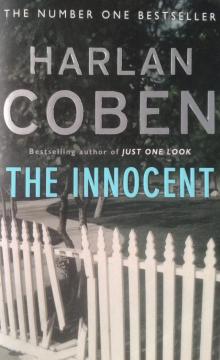 The Innocent
The Innocent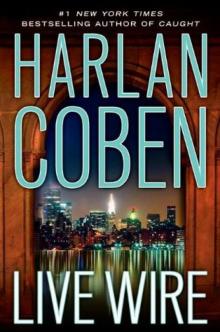 Live Wire
Live Wire Play Dead
Play Dead Drop Shot
Drop Shot Seconds Away
Seconds Away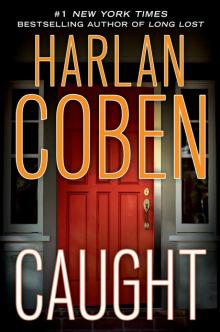 Caught
Caught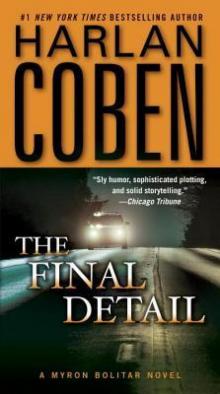 The Final Detail
The Final Detail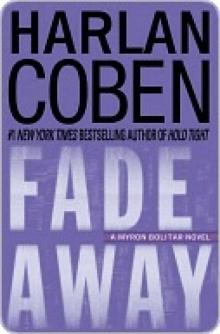 Fade Away
Fade Away Home
Home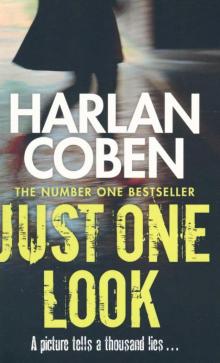 Just One Look
Just One Look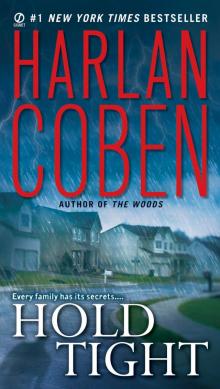 Hold Tight
Hold Tight Fool Me Once
Fool Me Once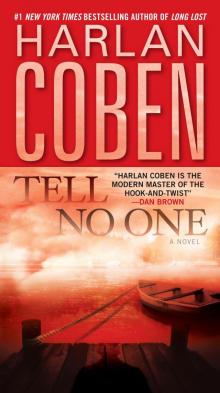 Tell No One
Tell No One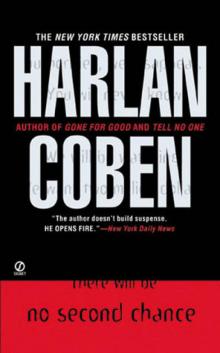 No Second Chance
No Second Chance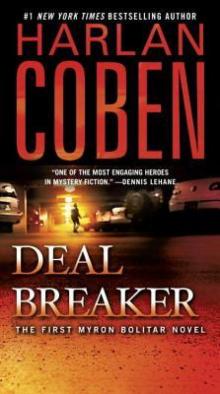 Deal Breaker
Deal Breaker Long Lost
Long Lost One False Move
One False Move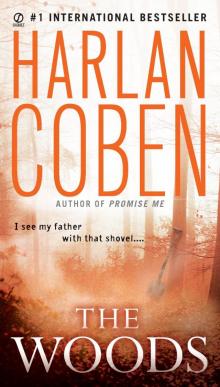 The Woods
The Woods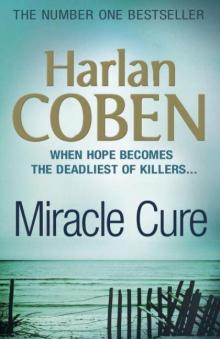 Miracle Cure
Miracle Cure Found
Found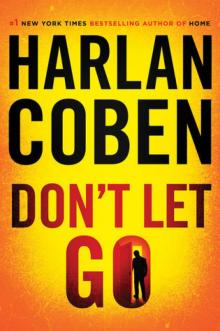 Don't Let Go
Don't Let Go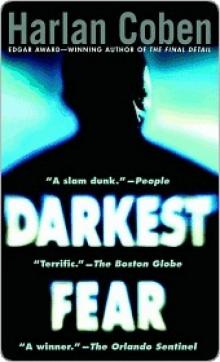 Darkest Fear
Darkest Fear The Stranger
The Stranger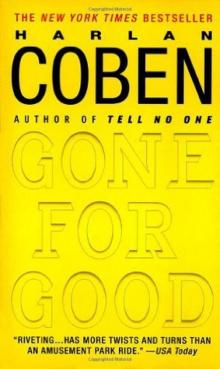 Gone for Good
Gone for Good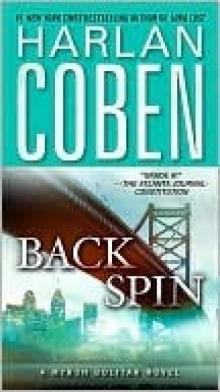 Back Spin
Back Spin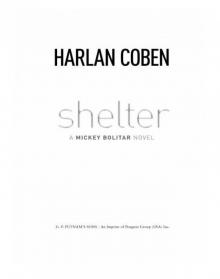 Shelter
Shelter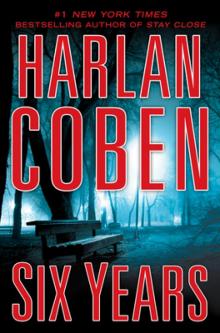 Six Years
Six Years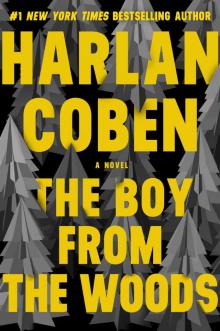 The Boy from the Woods
The Boy from the Woods Missing You
Missing You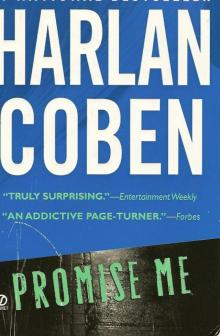 Promise Me mb-8
Promise Me mb-8 The Final Detail: A Myron Bolitar Novel
The Final Detail: A Myron Bolitar Novel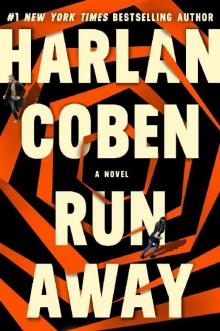 Run Away
Run Away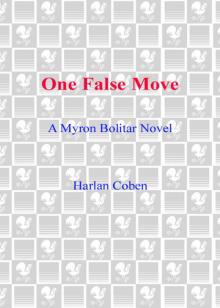 One False Move: A Myron Bolitar Novel
One False Move: A Myron Bolitar Novel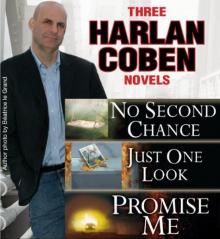 Three Harlan Coben Novels
Three Harlan Coben Novels the Woods (2007)
the Woods (2007) Tell No One (2001)
Tell No One (2001) the Innocent (2005)
the Innocent (2005)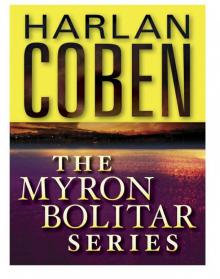 The Myron Bolitar Series 7-Book Bundle
The Myron Bolitar Series 7-Book Bundle Gone for Good (2002)
Gone for Good (2002) Caught (2010)
Caught (2010) Hold Tight (2008)
Hold Tight (2008)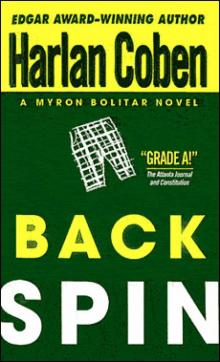 04 - Back Spin
04 - Back Spin Miracle Cure (1991)
Miracle Cure (1991) Harlan Coben 3 Novel Collection
Harlan Coben 3 Novel Collection Just One Look (2004)
Just One Look (2004)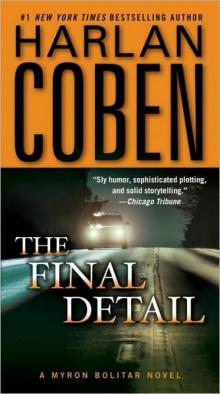 The Final Detail mb-6
The Final Detail mb-6 Play Dead (2010)
Play Dead (2010)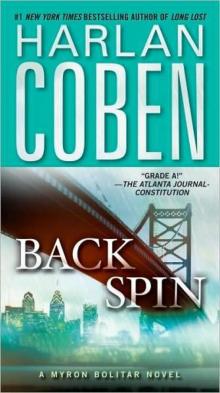 Back Spin mb-4
Back Spin mb-4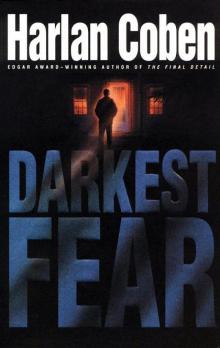 Darkest Fear mb-7
Darkest Fear mb-7